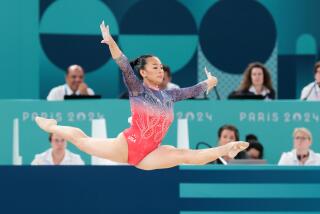The Other Comeback
- Share via
Even if the events of Jan. 6 at Detroit’s Cobo Arena had not occurred, the 1994 Winter Olympics might have been considered a comeback for figure skater Nancy Kerrigan.
Kerrigan won a bronze medal in the 1992 Winter Games, but dropped to fifth best at the 1993 World Figure Skating Championships in Prague. In the rarefied air of elite sports, a mere slip in the standings--especially when one is expected to rise--is seen as a slide of unnerving import. After her flawed long program at the Worlds, Kerrigan was caught moaning, “I just want to die.”
But that reaction would be nothing compared to her piercing response--”Why me?”--after being struck just above the knee by a baton-wielding assailant during the week of the U.S. Figure Skating Championships in January. Kerrigan had recovered from the Prague setback with the help of a sports psychologist and high-intensity training, and she went to Detroit favored to win the U.S. title and, consequently, the front-runner’s spot on the U.S. Olympic team. After the attack, she was placed on the team by fiat. But it was not at all certain that the 24-year-old would be ready for the Games, which opened yesterday in Lillehammer, Norway.
The physical challenge would be the easy part. No bones were broken, no muscles torn. And Kerrigan had access to the best rehabilitation equipment and methods. Even before she was back on the ice, she let the press watch her working out in a pool and the gym. By three weeks after the accident, she had started doing triple jumps at her hometown rink, on Nancy Kerrigan Way in Stoneham, Mass.
Kerrigan’s psychological fitness would be a bigger question. In interviews, she has quietly admitted to suffering knee-clutching nightmares and even to being startled at a party when she turned quickly and glimpsed someone holding a bag of potato chips close to her head. But Paul Wylie, Kerrigan’s training partner and 1992 Olympic figure skating silver medalist, declared in Newsweek, “Nancy Kerrigan is no weak sister. This hasn’t thrown her for a loop.” And her mother, in a TV interview in late January, turned quickly from tearful emotion to dry-eyed resolve when asked if she thought her daughter should retire. “Oh, no,” Brenda Kerrigan answered, “that’s not what this family is about. That’s giving up . . . no way!” Even Kerrigan said that she’d put past distractions behind her. “When I’m on the ice, nothing really affects me,” she said in the same interview.
While Kerrigan worked to return to form, Tonya Harding, winner of the national championship after Kerrigan was forced to withdraw, lost her balance. Harding, 23, also had been poised for a dramatic comeback. In 1991, she had outscored both Kerrigan and gold-medalist-to-be Kristi Yamaguchi to win the U.S. Championships, landing a gravity-disdaining triple axel jump, which only she and Japan’s Midori Ito, among the women, have pulled off in competition. In the 1992 Olympics, though, Harding finished a medal-less fourth, crashing the two times she attempted the 3 1/2-rotation jump.
As four men--Harding’s ex-husband, Jeff Gillooly, her sometime bodyguard Shawn Eric Eckardt, alleged Kerrigan knee-bruiser Shane Stant and Stant’s uncle Derrick Smith--were arrested and charged for conspiring to harm Kerrigan, accusations swirled about her own involvement in the plot. Harding issued denials and continued to train. As of press time, she had not been charged and remained on the U.S. Olympic team but that could change up until two days before competition begins. (If she is removed from the team, 13-year-old Michelle Kwan of Torrance will skate instead.)
No matter whom Kerrigan has to compete against, it seems that she can’t lose. If she wins another Olympic medal, especially gold, the fairy-tale comeback will be complete. But even in defeat, she’ll be crowned by the press and marketers for her Hepburnlike beauty and resilient spirit. As sports agent Michael Rosenberg of Palm Desert put it bluntly: “She went from an A-minus superstar to a spectacular superstar with one whack.”
Kerrigan’s Campbell’s Soup commercial is already in heavy rotation in Los Angeles, and the skater took a quick trip here in late January to film a Reebok spot, which will debut during the Olympics. Dave Fogelson, spokesman for the shoe company, wouldn’t give specifics of the script. But the general theme? “Overcoming obstacles,” he said.
More to Read
Go beyond the scoreboard
Get the latest on L.A.'s teams in the daily Sports Report newsletter.
You may occasionally receive promotional content from the Los Angeles Times.






